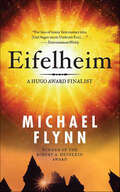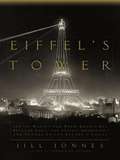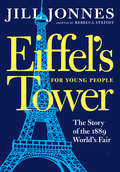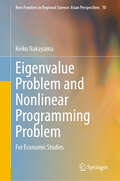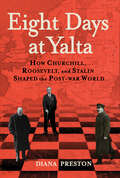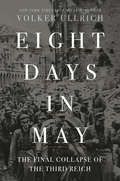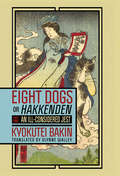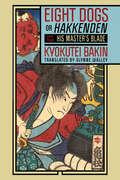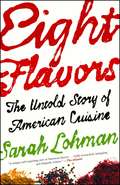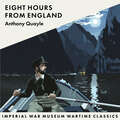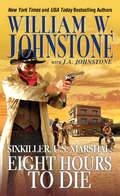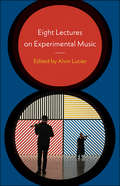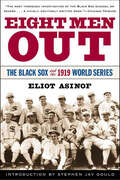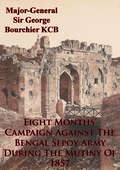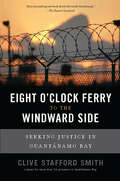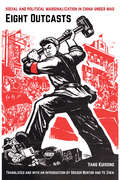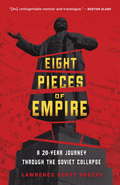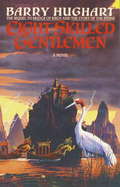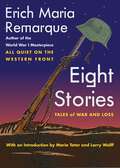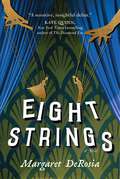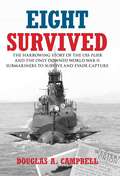- Table View
- List View
Eifelheim
by Michael FlynnOver the centuries, one small town in Germany has disappeared and never been resettled. Tom, a historian, and his theoretical physicist girlfriend Sharon, become interested. By all logic, the town should have survived. What's so special about Eifelheim? Father Dietrich is the village priest of Eifelheim, in the year 1348, when the Black Death is gathering strength but is still not nearby. Dietrich is an educated man, and to his astonishment becomes the first contact person between humanity and an alien race from a distant star, when their ship crashes in the nearby forest. It is a time of wonders, in the shadow of the plague. Flynn gives us the full richness and strangeness of medieval life, as well as some terrific aliens. Tom and Sharon, and Father Deitrich have a strange destiny of tragedy and triumph in this brilliant SF novel.
Eifelheim
by Michael Flynn“Carl Sagan meets Umberto Eco. . . . Bursting with pungent historical detail . . . this dense, provocative novel offers big rewards to patient readers.” —Entertainment WeeklyThe alien world of medieval Europe lives again, transformed by the physics of the future, by a winner of the Heinlein Award.Over the centuries, one small town in Germany has disappeared and never been resettled. Tom, a historian, and his theoretical physicist girlfriend Sharon, become interested. By all logic, the town should have survived. What’s so special about Eifelheim?Father Dietrich is the village priest of Eifelheim, in the year 1348, when the Black Death is gathering strength but is still not nearby. Dietrich is an educated man, and to his astonishment becomes the first contact person between humanity and an alien race from a distant star, when their ship crashes in the nearby forest.It is a time of wonders, in the shadow of the plague. Tom and Sharon, and Father Deitrich have a strange destiny of tragedy and triumph in Eifelheim, the brilliant science fiction novel by Michael Flynn.“Heartbreaking. . . . Flynn masterfully achieves an intricate panorama of medieval life, full of fascinatingly realized human and [alien] characters whose fates interconnect with poignant irony.” —Publishers Weekly, starred review“Meticulously researched, intense, mesmerizing novel . . . for readers seeking thoughtful science fiction of the highest order.” —Kirkus Reviews, starred review“Eifelheim may turn out to be the best science fiction novel this year.” —Orson Scott Card, Hugo Award–winning author of Ender’s Game
Eiffel's Tower
by Jill JonnesSince it opened in May 1889, the Eiffel Tower has become an iconic image of modern times: as much a beacon of technological progress as an enduring symbol of Paris and French culture. But as engineer Gustave Eiffel built the now-famous landmark to be the spectacular centrepiece of the 1889 World's Fair, he stirred up a storm of vitriol from Parisian tastemakers, law-suits and predictions of a certain structural calamity. A compelling account of the tower's creation as well as a superb portrait of Belle Epoque France.
Eiffel's Tower for Young People
by Jill JonnesEiffel's Tower for Young People is a vivid, lively pageant of people and cultures meeting—and competing—on the world stage at the dawn of the modern era.The 1889 World's Fair was a worldwide event showcasing the cutting-edge cultural and technological accomplishments of the world's most powerful nations on the verge of a new century. France, with its long history of sophistication and cultivation and a new republican government, presented the Eiffel Tower, the world's tallest structure, crafted from eighteen thousand pieces of wrought iron and 2.5 million rivets, as a symbol of national pride and engineering superiority. The United States, with its brash, can-do spirit, full of pride in its frontier and its ingenuity, presented the rollicking Wild West show of Buffalo Bill Cody and Annie Oakley, and the marvelous new phonograph of Thomas Edison.With historical photos throughout, outsized personalities, squabbling artists, and a sprinkling of royalty, this dramatic history opens a window to a piece of the past that, in its passions and politics, is an unforgettable portrait of a unique moment in history.
Eigenvalue Problem and Nonlinear Programming Problem: For Economic Studies (New Frontiers in Regional Science: Asian Perspectives #70)
by Keiko NakayamaThis book focuses on the Frobenius theorem regarding a nonlinear simultaneous system. The Frobenius theorem is well known as a condition for a linear simultaneous system’s having a nonnegative solution. Generally, however, the condition of a simultaneous system, including a non-linear system’s having a nonnegative solution, is hardly discussed at all. This book, therefore, extends the conventional Frobenius theorem for nonlinear simultaneous systems for economic analysis. Almost all static optimization problems in economics involve nonlinear programing. Theoretical models in economics are described in the form of a simultaneous system resulting from the rational optimization behavior of households and enterprises. On the other hand, rational optimization behavior of households and enterprises is, mathematically speaking, expressed as nonlinear programing. For this reason it is important to understand the meaning of nonlinear programing. Because this book includes explanations of the relations among various restrictions in a nonlinear programing systematically and clearly, this book is suitable for students in graduate school programs in economics.
Eight Acts
by A. L. LesterIt's the summer of 1967 and the Sexual Offences Act has just decriminalized consensual gay sex in private between two men over twenty-one. Percy Wright and his friend Les Baker have both taken temporary jobs teaching English as a foreign language in London during their long summer break from teaching at a rural boarding school near Oxford.Percy is keen to soak up some theatre, music, and general culture, whilst Les is also keen to experience the varied gay social scene. When Les picks up a man called Phil at the box office of the Albert Hall when he goes to buy tickets to a Promenade Concert, Percy inadvertently gets thrown together with Adrian Framlingham, Phil’s friend.Adrian is all the things Percy likes in a man -- funny, kind and steady. When Les gets hurt, Percy turns to Adrian for support, but as the end of the summer looms it seems as if their affair will come to a natural end.What will happen when Percy goes back to his everyday life as a house-master? Will he and Adrian stay in touch? Does he even want a long-distance relationship when arranging to meet someone for sex is still illegal, even if the act itself is not?Trigger warning: A secondary character suffers an off-screen sexual assault.
Eight Cousins (The Louisa May Alcott Hidden Gems Collection)
by Louisa May AlcottA recently orphaned girl meets her extended family—including seven rambunctious cousins—for the first time in this charming novel from Louisa May Alcott, author of Little Women!Thirteen-year-old Rose Campbell never knew her mother, and the death of her father leaves her reeling and hopelessly lonely. She&’s sent to live with her maiden great aunts, the matriarchs of her father&’s wealthy Boston family who she&’s never met. The elderly women&’s quiet household suits Rose&’s mourning, but the arrival of her appointed guardian, Uncle Alec, challenges the status quo. With Alec as her guide, Rose is properly introduced to the other residents of &“Aunt-Hill,&” including Alec&’s four sisters and their sons. Having so many relations overwhelms Rose at first. Her dour Aunt Myra convinces her she has a fragile constitution while fashionable Aunt Clara turns Rose&’s head with stylish clothes. And the collective energy of male cousins ranging from age six to sixteen is more than she knows how to handle. But Uncle Alec&’s steady commitment to seeing Rose flourish helps her find her footing and grow to love her eccentric family. She even &“adopts&” Great Aunt Plenty and Peace&’s housemaid, Phebe, as her sister. Surrounded by people who love her, Rose slowly but surely goes from sickly and timid to healthy, active, and bold as she learns to keep her father&’s memory close while setting a course for a happy future.
Eight Days at Yalta: How Churchill, Roosevelt, and Stalin Shaped the Post-war World
by Diana PrestonThe authoritative history of the pivotal conference between Allied leaders at the close of WWII, based on revealing firsthand accounts.Crimea, 1945. As the last battles of WWII were fought, US President Franklin Roosevelt, British Prime Minister Winston Churchill, and Soviet Premier Joseph Stalin—the so-called “Big Three” —met in the Crimean resort town of Yalta. Over eight days of bargaining, bombast, and intermittent bonhomie, they decided on the endgame of the war against Nazi Germany and how the defeated nation should be governed. They also worked out the constitution of the nascent United Nations; the price of Soviet entry into the war against Japan; the new borders of Poland; and spheres of influence across Eastern Europe, the Balkans, and Greece.Drawing on the lively accounts of those who were there—from the leaders and advisors such as Averell Harriman, Anthony Eden, and Andrei Gromyko, to Churchill’s secretary Marian Holmes and FDR’s daughter Anna Boettiger—Diana Preston has crafted a masterful chronicle of the conference that created the post-war world.Who “won” Yalta has been debated ever since. After Germany’s surrender, Churchill wrote to the new president, Harry Truman, of “an iron curtain” that was now “drawn upon [the Soviets’] front.” Knowing his troops controlled eastern Europe, Stalin’s judgment in April 1945 thus speaks volumes: “Whoever occupies a territory also imposes on it his own social system.”
Eight Days in May: The Final Collapse Of The Third Reich
by Volker UllrichThe best-selling author of Hitler: Ascent and Hitler: Downfall reconstructs the chaotic, otherworldly last days of Nazi Germany. In a bunker deep below Berlin’s Old Reich Chancellery, Adolf Hitler and his new bride, Eva Braun, took their own lives just after 3:00 p.m. on April 30, 1945—Hitler by gunshot to the temple, Braun by ingesting cyanide. But the Führer’s suicide did not instantly end either Nazism or the Second World War in Europe. Far from it: the eight days that followed were among the most traumatic in modern history, witnessing not only the final paroxysms of bloodshed and the frantic surrender of the Wehrmacht, but the total disintegration of the once-mighty Third Reich. In Eight Days in May, the award-winning historian and Hitler biographer Volker Ullrich draws on an astonishing variety of sources, including diaries and letters of ordinary Germans, to narrate a society’s descent into Hobbesian chaos. In the town of Demmin in the north, residents succumbed to madness and committed mass suicide. In Berlin, Soviet soldiers raped German civilians on a near-unprecedented scale. In Nazi-occupied Prague, Czech insurgents led an uprising in the hope that General George S. Patton would come to their aid but were brutally put down by German units in the city. Throughout the remains of Third Reich, huge numbers of people were on the move, creating a surrealistic tableau: death marches of concentration-camp inmates crossed paths with retreating Wehrmacht soldiers and groups of refugees; columns of POWs encountered those of liberated slave laborers and bombed-out people returning home. A taut, propulsive narrative, Eight Days in May takes us inside the phantomlike regime of Hitler’s chosen successor, Admiral Karl Dönitz, revealing how the desperate attempt to impose order utterly failed, as frontline soldiers deserted and Nazi Party fanatics called on German civilians to martyr themselves in a last stand against encroaching Allied forces. In truth, however, the post-Hitler government represented continuity more than change: its leaders categorically refused to take responsibility for their crimes against humanity, an attitude typical not just of the Nazi elite but also of large segments of the German populace. The consequences would be severe. Eight Days in May is not only an indispensable account of the Nazi endgame, but a historic work that brilliantly examines the costs of mass delusion.
Eight Dogs, or "Hakkenden": Part One—An Ill-Considered Jest
by Kyokutei BakinKyokutei Bakin's Nansō Satomi hakkenden is one of the monuments of Japanese literature. This multigenerational samurai saga was one of the most popular and influential books of the nineteenth century and has been adapted many times into film, television, fiction, and comics. An Ill-Considered Jest, the first part of Hakkenden, tells the story of the Satomi clan patriarch Yoshizane and his daughter Princess Fuse. An ill-advised comment forces Yoshizane to betroth his daughter to the family dog, creating a supernatural union that ultimately produces the Eight Dog Warriors. Princess Fuse's heroic and tragic sacrifice, and her strength, intelligence, and self-determination throughout, render her an immortal character within Japanese fiction.Eight Dogs is the culmination of centuries of premodern Japanese tale-telling, combining aspects of historical romance, fantasy, Tokugawa-era popular fiction, and Chinese vernacular stories. Glynne Walley's lively translation conveys the witty and colorful prose of the original, producing a faithful and entertaining edition of this important literary classic.
Eight Dogs, or "Hakkenden": Part Two—His Master's Blade
by Kyokutei BakinKyokutei Bakin's Nansō Satomi Hakkenden is one of the monuments of Japanese literature. This multigenerational samurai saga was one of the most popular and influential books of the nineteenth century and has been adapted many times into film, television, fiction, and comics.His Master's Blade, the second part of Hakkenden, begins the story of the eight Dog Warriors created from the mystic union between Princess Fuse and the dog Yatsufusa and born into eight different samurai families in fifteenth-century Japan. The first is Inuzuka Shino, orphaned descendent of proud warriors. Left with nothing save a magical sword and the bead that marks him as a Dog Warrior, young Shino escapes his evil aunt and uncle and sets out to restore his family name. Unaware of their karmic bond, Shino and the other Dog Warriors are drawn into a world of vendettas and quests, gallants, and rogues, as each strives to learn his true nature and find his place in the eight-man fraternity.
Eight Flavors: The Untold Story of American Cuisine
by Sarah Lohman&“Very cool…a breezy American culinary history that you didn&’t know you wanted&” (Bon Appetit) reveals a fascinating look at our past and uses long-forgotten recipes to explain how eight flavors changed how we eat.The United States boasts a culturally and ethnically diverse population that makes for a continually changing culinary landscape. But a young historical gastronomist named Sarah Lohman discovered that American food is united by eight flavors: black pepper, vanilla, curry powder, chili powder, soy sauce, garlic, MSG, and Sriracha. In &“a unique and surprising view of American history…richly researched, intriguing, and elegantly written&” (The Atlantic), Lohman sets out to explore how these influential ingredients made their way to the American table. She begins in the archives, searching through economic, scientific, political, religious, and culinary records. She pores over cookbooks and manuscripts, dating back to the eighteenth century, through modern standards like How to Cook Everything by Mark Bittman. Lohman discovers when each of these eight flavors first appear in American kitchens—then she asks why. &“A fresh, original perspective to American culinary history&” (The Christian Science Monitor), Eight Flavors takes you on a journey through the past to tell us something about our present, and our future. We meet John Crowninshield a New England merchant who traveled to Sumatra in the 1790s in search of black pepper. And Edmond Albius, a twelve-year-old slave who lived on an island off the coast of Madagascar, who discovered the technique still used to pollinate vanilla orchids today. Weaving together original research, historical recipes, gorgeous illustrations, and Lohman&’s own adventures both in the kitchen and in the field, Eight Flavors is a delicious treat—which &“may make you hungry&” (Bustle).
Eight Hours From England: Imperial War Museum Wartime Classics
by Anthony QuayleAutumn 1943. Realising that his feelings for his sweetheart are not reciprocated, Major John Overton accepts a posting behind enemy lines in Nazi-Occupied Albania. Arriving to find the situation in disarray, he attempts to overcome geographical challenges and political intrigues to set up a new camp in the mountains overlooking the Adriatic.As he struggles to complete his mission amidst a chaotic backdrop, Overton is left to ruminate on loyalty, comradeship and his own future.Based on Anthony Quayle's own wartime experience with the Special Operations Executive (SOE), this new edition of a 1945 classic includes a contextual introduction from IWM which sheds new light on the fascinating true events that inspired its author.(P)2019 Headline Publishing Group Ltd
Eight Hours to Die (Sixkiller, U.S. Marshal #3)
by William W. Johnstone J.A. JohnstoneJohn Henry Sixkiller must protect a New Mexico town—from its own sheriff—in this powerful Western from &“a master storyteller&” (Publishers Weekly). William W. Johnstone, the beloved, bestselling frontier chronicler, brings to life the story based on the historical lawman born and bred in Cherokee Nation: Sixkiller. In the wild, wild west there is no man more dangerous—on either side of the law.Three men dead. And Sixkiller might be next . . . The territorial governor has sent three lawmen to clean up the mess that is Chico, New Mexico—and not one of those lawmen has made it out alive. A crooked sheriff has the terrified denizens of Chico under his boot heel, so the governor turns to John Henry Sixkiller, sending him undercover as a gunman for hire. So far, Sixkiller has bloodied his opponents in every battle he&’s fought in the Southwest. But this one could affect the entire country: A group of merciless land pirates have been hiding behind Chico&’s brutal sheriff. Their goal: to take the entire territory hostage and sell it lock, stock and barrel to Mexico—gleefully slaughtering anyone who gets in the way . . .
Eight Lectures on Experimental Music
by Alvin LucierBrilliant lectures by the most influential experimental music composers of our time In this brilliant collection, path-breaking figures of American experimental music discuss the meaning of their work at the turn of the twenty-first century. Presented between 1989 and 2002 at Wesleyan University, these captivating lectures provide rare insights by composers whose work has shaped our understanding of what it means to be experimental: Maryanne Amacher, Robert Ashley, Philip Glass, Meredith Monk, Steve Reich, James Tenney, Christian Wolff, and La Monte Young. Collected here for the first time, together these lectures tell the story of twentieth-century American experimental music, covering such topics as repetition, phase, drone, duration, collaboration, and technological innovation. Containing introductory comments by Lucier and the original question and answer sessions between the students and the composers, this book makes the theory and practice of experimental music available and accessible to a new generation of students, artists, and scholars.
Eight Men Out
by Eliot AsinofIn 1919 eight players for the Chicago White Socks conspired with gamblers to fix the World Series. This book relates details of the fix and the aftermath.
Eight Men Out: The Black Sox and the 1919 World Series
by Eliot AsinofA “vividly, excitingly written” classic of baseball history: “The most thorough investigation of the Black Sox scandal on record” (Chicago Tribune).It was “the most gigantic sporting swindle in the history of America”—the 1919 fix of the World Series and attempted cover-up. Eliot Asinof has reconstructed the entire scene-by-scene story of the fantastic scandal in which eight Chicago White Sox players arranged with the nation’s leading gamblers to throw the Series in Cincinnati. Mr. Asinof vividly describes the tense meetings, the hitches in the conniving, the actual plays in which the Series was thrown, the Grand Jury indictment, and the famous 1921 trial. Moving behind the scenes, he perceptively examines the motives and backgrounds of the players and the conditions that made the improbable fix all too possible.Here, too, is a graphic picture of the American underworld that managed the fix, the deeply shocked newspapermen who uncovered the story, and the war-exhausted nation that turned with relief and pride to the Series, only to be rocked by the scandal. Far more than a superbly told baseball story, this is a compelling slice of American history in the aftermath of World War I and at the cusp of the Roaring Twenties.“Dramatic detail . . . an admirable journalistic feat.” —The New York Times“As thrilling as a cops and robbers tome.” —The Boston Globe
Eight Months’ Campaign Against The Bengal Sepoy Army During The Mutiny Of 1857 [Illustrated Edition]
by Major-General Sir George Bourchier KCB[Illustrated with over one hundred maps, photos and portraits, of the battles, individuals and places involved in the Indian Mutiny]"The Indian Mutiny from the siege of Delhi to the mutineers' defeat at Cawnpore, via the relief of Lucknow. Written by an officer of the British Horse Artillery.An account of the Indian Mutiny in 1857 by a British participant. The author, Col. Bourchier of the Bengal Horse Artillery, describes the British siege and storming of Delhi - including the foiling of a fiendish plan to intoxicate the besieging forces; the defeat of the mutineers at Agra; the siege and massacre at Cawnpore; the relief of Lucknow by Havelock and Outram and its second relief by Sir Colin Campbell; and finally the defeat of the Gwalior mutineers at Cawnpore. An action-packed account of eight months' of remorseless fighting."-Print Ed.
Eight O'Clock Ferry to the Windward Side: Seeking Justice in Guantánamo Bay
by Clive Stafford SmithEvery time human rights lawyer Clive Stafford Smith lands in Cuba, he takes the eight o'clock ferry to the windward side; his journey ends at Guantánamo Bay. One of the few people in the world who has ongoing independent access to the prison, Smith reveals the grotesque injustices that are perpetrated there in the name of national security-including the justifications created to legitimate the use of torture and the bureaucratic structures that have been put in place to shield prison authorities from legal accountability. <P><P>By bearing witness to the stories of the forty prisoners that he represents, Smith asks us to consider what is done to American democracy when the rule of law is jettisoned in the name of combating terrorism.
Eight Outcasts: Social and Political Marginalization in China under Mao
by Yang KuisongThe 1949 Communist Revolution marked a period of earthshaking change in China. Political, economic, ideological, and cultural movements galvanized the country, culminating in dramatic social transformations at all levels, including the persecution of hundreds of thousands of the country’s citizens. Based on normally inaccessible records of confessions, interrogations, trial transcripts, and depositions, Eight Outcasts tells the stories of eight victims of the Maoist dictatorship. It introduces readers to individuals accused of infractions such as corruption, political wrong thinking, homosexuality, illicit sexual activity, foreign ties, or "historical problems" (connections to the former Kuomintang regime) in the period between the revolution and Mao’s death in 1976. Each chapter brings stories of China’s voiceless citizens to light, broadening our knowledge of this important transitional period.
Eight Pieces of Empire
by Lawrence Scott SheetsA two-decade journey, panoramic in scope yet intimate in detail, through the hopes, sorrows, and conflagrations of an unraveled empire and the people living in it.Not with a bang, but with a quiet, ten-minute address on Christmas Day 1991: this is how the Soviet Union met its end. Lawrence Scott Sheets, who was then living in Moscow as a young foreign correspondent, went to the center of the capital to witness the response. "In the streets around Red Square," he writes, "life went on as usual. One would not have known that 300 million people had just become citizens of other countries."But in the wake of that one deceptively calm moment, conflict and violence soon followed. Some of the emergent new countries began to shed totalitarianism, while others sought to revive their own dead empires or were led by barely or totally unreformed ex-Soviet leaders who built equally or even more repressive political machines. Since the late 1980s, Sheets lived and reported from the former USSR and saw firsthand the reverberations of the collapse of empire across Russia, Georgia, Uzbekistan, Afghanistan, Azerbaijan, Armenia, Ukraine, and Chechnya. Eight Pieces of Empire draws readers into the people, politics and day-to-day life in the region, painting a vivid portrait of a tumultuous time.On the 20th anniversary of the fall of the USSR, Sheets' stories about people living through these tectonic shifts of fortune--a trio of female saboteurs in Chechnya, the chaos of newly independent Georgia in the early 1990s, young hustlers eager to strike it rich in the post-Soviet economic vacuum--reveal the underreported and surprising ways in which the ghosts of empire still haunt these lands and the world.From the Hardcover edition.
Eight Skilled Gentlemen
by Barry HughartThe sequel to Bridge of Birds and The Story of the Stone, this fantasy tale is the equivalent of Holmes and Watson in an ancient China that never was. Master Li and Number Ten Ox investigate a strange case of murder in a book that is equal parts Chinese folklore, sly parody, adventure, horror and fun.
Eight Stories: Tales of War and Loss (Washington Mews #3)
by Erich Maria Remarque Maria Tatar Larry WolffA compelling set of short stories chronicling post-World War I life in Germany, from the author of the classic, All Quiet on the Western Front. German-American novelist Erich Maria Remarque captured the emotional anguish of a generation in his World War I masterpiece, All Quiet on the Western Front, as well as in an impressive selection of novels, plays, and short stories. This exquisite collection revives Remarque&’s unforgettable voice, presenting a series of short stories that have long ago faded from public memory. From the haunting description of an abandoned battlefield to the pain of losing a loved one in the war to soldiers&’ struggles with what we now recognize as PTSD, the stories offer an unflinching glimpse into the physical, emotional, and even spiritual implications of World War I. In this collection, we follow the trials of naïve war widow Annette Stoll, reflect on the power of small acts of kindness toward a dying soldier, and join Johann Bartok, a weary prisoner of war, in his struggle to reunite with his wife. Although a century has passed since the end of the Great War, Remarque&’s writing offers a timeless reflection on the many costs of war. Eight Stories offers a beautiful tribute to the pain that war inflicts on soldiers and civilians alike, and resurrects the work of a master author whose legacy—like the war itself—will endure for generations to come.
Eight Strings
by Margaret DeRosiaAn enthralling coming-of-age debut novel about a young woman in late 19th-century Venice who becomes a man to join the male-dominated world of the theater as a puppeteer—in the vein of Sarah Waters.Ever since her grandfather introduced her to eight-string marionettes, Francesca has dreamed of performing from the rafters of Venice&’s popular Minerva Theater. There&’s just one problem: the profession is only open to men. When her father arranges to sell her into marriage to pay off his gambling debts, Francesca flees her home. Masquerading as a male orphan named Franco, she secures an apprenticeship with the Minerva&’s eccentric ensemble of puppeteers. Amid the elaborate set-pieces, the glittering limes, and the wooden marionettes, she finds a place where she belongs—and grows into the person she was always meant to be: Franco. The past threatens to catch up with Franco when his childhood friend Annella reappears and recognizes him at the theater. Now a paid companion to an influential woman, Annella understands the lengths one must go to survive, and she promises to keep Franco&’s secret. Desire sparks between them, and they find themselves playing a dangerous game against the most powerful figures of Venice&’s underworld. With their lives—and the fate of the Minerva—hanging in the balance, Franco must discover who is pulling the strings before it&’s too late. Rich in historic detail and imbued with sharp social commentary, Eight Strings is a gorgeous, spellbinding debut that celebrates love, life, and art in all its forms.
Eight Survived: The Harrowing Story of the USS Flier and the Only Downed World War II Submariners to Survive and Evade Capture
by Douglas A. CampbellOn the night of August 13, 1944, the U.S. submarine Flier struck a mine in the Sulu Sea in the southern Philippines as it steamed along the surface. All but fifteen of the more than eighty-strong crew went down with the vessel. Of those left floating in the dark, eight survived by swimming for seventeen hours before washing ashore on an uninhabited island. The story of the Flier and its eight survivors is wholly unique in the annals of U.S. military history.Eight Survived tells the gripping story of the doomed submarine and its crew from its first patrol, during which it sank several enemy ships, to the explosion in the Sulu Sea. Drawing on interviews with the survivors and on a visit to the jungle where they washed ashore—where a cast of fascinating characters helped the U.S. sailors evade the Japanese—Douglas Campbell fully captures the combination of extraordinary courage and luck that marked one of the most heroic episodes of World War II.

